WHATSOEVER YOU DO TO THE LEAST OF MY BROTHERS… (Mt 25:40)

Caring the wounded humanity

Our Social Work Ministry is directly inspired by the vision of our Foundress, Servant of God Mother ThatipathriGnanamma. It was her profound desire to strive towards a society characterized by equality and justice that led her to overcome her challenges, break free from the societal constraints of her time, and dedicate herself to the mission of liberating others. Education was the tool she employed to enact the change she envisioned - a holistic education that encompassed not only secular knowledge but also the nurturing of the soul, empowering individuals to uplift themselves and extend support to others in their journey toward empowerment. Our Foundress, Mother Gnanamma, acquired this art of empowering humanity from her beloved Master, Jesus.
Our concern towards our brethren in need
Jesus' mission was to educate and empower people, leading to a transformative change in society. His teachings were rooted in guiding individuals toward self-liberation and self-actualization, fostering the creation of a world characterized by love, care, and values. Similarly, our mission is to guide all humanity towards a life where they discover the strength to live fully and establish empowered families and homes.
Today, the Social Work Ministry of the Congregation stands as a tangible manifestation of our Foundress Mother Gnanamma’s educational mission. This ministry encompasses various vulnerable target groups, including children, youth, women, the elderly, prisoners, and marginalized individuals. Across all our communities, we are dedicated to empowering these groups through our ministry initiatives. Many communities are specifically established or engaged in educating and empowering members of their target groups. Sisters actively participate in diverse mission activities aimed at restoring community equilibrium and addressing societal inequalities. Our Social Work Ministry includes initiatives such as boarding homes, women's development programs, child development projects, rights-based approaches, humanitarian efforts, and prison ministry.
Vision
“In solidarity with the oppressed to work for their upliftment so that they may live with dignity and respect”.
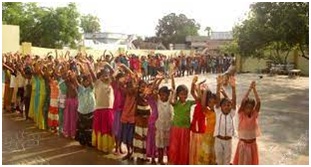
Our primary goal is to lead souls to embrace Gospel values of fraternal love and human compassion. At the heart of our approach lies the evangelical mission of Jesus, which urges us to extend a positive attitude towards the marginalized, to empathize with and embrace them. We strive to be liberators for those oppressed by societal structures and bring comfort to those who suffer.
Our strategies
- To educate society.
- To provide the weak and the poor with the tools of faith and values..
- To empower them to improve their quality of life.
- To assist them in reclaiming their human dignity.
- To encourage the underprivileged to enhance their standard of living.
- To raise awareness about the importance of education, moral values, and civic responsibilities.
Vision translated into action
We provide support to various marginalized groups including Dalits, tribals, prisoners, the elderly, individuals with disabilities, refugees, terminally ill patients, abandoned and orphaned children, and women. Our assistance encompasses educational support (academic, technical, legal, and conscientization), advocacy efforts (such as social awareness programs and legal aid for prisoners, women, and Dalits), and provision of safe accommodation (through operating homes for children and the elderly).
The following are the established institutions providing social services to those in need:
- Homes for Children (orphans and children of prisoners).
- Women Empowerment Centers.
- Homes for the elderly, terminally ill, and physically challenged individuals.
- Special services are offered through remedial education centers and ministries for the Irular people.
01. HOMES FOR THE CHILDREN
“Let the little Children come to me, and do not stop them; for it is to such as these the Kingdom of God belongs. And He took them up in his arms, laid his hands on them and blessed them” (Mk10:14, 16).
Children represent the most vulnerable segment of society, and addressing their needs is a crucial ministry in today’s context. By educating and empowering this marginalized group, we have the opportunity to positively shape the future. Following in the footsteps of our Mother Foundress, we pledge ourselves to the distinct and exclusive empowerment of children.
The call of Jesus compels us to serve as many children as possible, particularly those from economically disadvantaged backgrounds, and lead them to Jesus. Through our social work efforts, we extend our care to the following categories of children: child laborers, children affected by AIDS, delinquent children, differently-abled children, economically disadvantaged children, children from gypsy communities, orphaned children, children of prisoners, children from Scheduled Castes/Scheduled Tribes (SC/ST), street children, and tribal girls.
Types of work, we do for children in need
- Homes for the children
- Remedial school
- Summer camps
Types of homes for children
- Homes for economically backward and orphan children
- Homes for special children (street children, SC/ST children, differently-abled children)
- Children Hostels
| Homes for economically backward and orphan children | Chethupattu, Christianpet, Gunadala, Kilacheri, Korukollu, Kumilanguzhi, Kuttakadu, Nandyal, Peddakottala, Roshanagaram, Royapuram, Telaprolu, Velliavilai. |
| Homes for special children | Prisoners’ children: Cleveland Town, NGGO Colony Differently-abled children: Kodur Children infected with AIDS: Burdwan Tribal children: Balichak, Belphahari, Dumka, Kattupadi. Rajgram SC/ST children: Chittoor, Thirupathy, Nandyal Street children: Mettuguda Metagalli: Transit boarding and tuition centre |
| Hostels | Bolarum, Punalvasal |
02. WOMEN EMPOWERMENT
The oppressed condition of women

According to India's Constitution, women are recognized as legal citizens of the country and are entitled to equal rights with men. However, despite the constitutional provision, women continue to face powerlessness and mistreatment both within and outside their homes, as indicated by current statistics. Although India is gradually moving away from a male-dominated culture, discrimination remains prevalent in rural and urban areas across all segments of society. Despite constitutional guarantees of equality, legal protections often have limited effectiveness in the face of prevailing patriarchal traditions.
Due to the lack of acceptance from a male-dominated society, Indian women endure significant suffering. This gender bias perpetuates the control of women by patriarchal figures and contributes to the challenges faced by Indian women today.
The courageous woman

Given the challenging conditions faced by women today, it's difficult to imagine the unimaginable and indescribable status they endured in 1874. During that time, women were denied basic human rights such as education, decision-making autonomy, and inheritance. There were no schools for women, and they were excluded from educational opportunities altogether. Witnessing this disparity deeply troubled Mother Gnanamma, inspiring her to take action. As a result, she established a school exclusively for girls in the village of Kilacheri on 03.05.1963. Mother Gnanamma’s concern extended beyond mere education; she aimed for the total liberation of women, recognizing their vital role in society. She firmly believed that sustainable development hinges on the participation and empowerment of women.
By equipping women with education, they can actively engage in economic and societal development, thereby unlocking the full potential of society as a whole.
In the footsteps of our Mother Gnanamma
We empower various categories of women, including widows and those abandoned, domestic workers and unorganized daily laborers, women in prison, sex workers, trafficked women, impoverished rural women, the elderly, and tribal women.
Our mission centers
| Women empowerment centers | Hostels | Unaided technical centers |
|---|---|---|
| Kalakambadi | Varadarajanpet | Perungudi (Chennai) |
| Pavagada | Vellore | Thatchur |
| Parinagar | Vellore | |
| Kadambathur | ||
| Kurmun | ||
| Sitheri | ||
| Thatchur | ||
| Theresapuram | ||
| Thiruvallur | ||
| Telaprolu | ||
| Villupuram |
03. HOMES FOR THE AGED, TERMINALLY ILL, PHYSICALLY CHALLENGED
Homes for the Aged - Gudiyatham
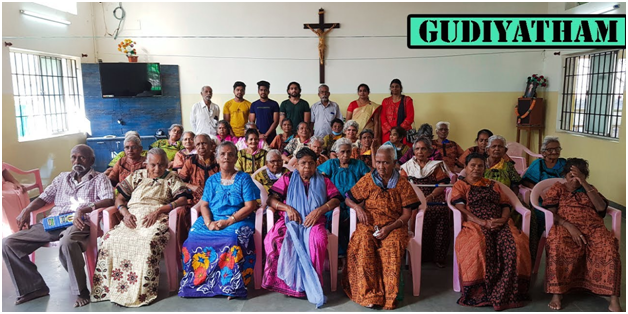
We believe in providing excellent nursing care and a warm, compassionate environment for the elderly. Our goal is to create a home-like atmosphere where they feel valued and cared for. We offer various activities to maintain cognitive skills and foster socialization, ensuring a clean and cheerful environment. Spiritual enhancement and counseling are also provided, allowing them to stay connected to their faith. Recreation therapy brings joy and fulfillment to their lives, and we strive to ensure their comfort, safety, and dignity in their later years. Regular medical checkups are conducted to monitor their health. Our mission is to create a loving and spiritual community for older adults, guided by the values of fraternity, service, and prayer ingrained in our Annite foundation. While our ministry may be seen as relief work, it holds significant importance in providing essential care and attention to the elderly. This ministry serves not only the Church but also society at large, offering support and comfort to those in need.
Home for the terminally ill - Burdwan
Since 2010, we have been operating the Chetana Community Care Centre (CCCC) in Jhinguti, Burdwan, West Bengal, where we serve the most vulnerable community of People Living with HIV/AIDS (PLHA). Our program aims to reduce HIV/AIDS-related morbidity and mortality in both adults and children, mitigate the impact of HIV on children and women through prevention, treatment, and care, and embody God's compassionate love in our actions. Currently, we provide care for 20 destitute children affected by the disease.
Home for the physically challenged - Kodur
In our society, where divisions based on caste, creed, and status are prevalent, the handicapped are further marginalized due to their dependency on others for their daily needs. They are often perceived as burdens to their families and, at times, even considered as punishments from God. Sadly, only a small fraction, approximately 5%, of deaf, blind, and mentally challenged children have access to educational facilities in our country. Moreover, the specialized institutions available primarily cater to the upper-class elite society and are predominantly located in urban areas. Recognizing these challenges, we are passionately dedicated to serving physically challenged children in Kodur.
Objectives of our deaf and dumb school at Kodur
- To love, include, and cater to the needs of the disabled.
- To accommodate disabled children in our home and provide them with a chance to learn.
- To improve their health and hygiene through medical checkups and treatment.Provide them with speech therapy to facilitate their hearing capacity.
- To nurture future leaders.
- To help them maintain optimism.
- To assist them in increasing their self-confidence and self-esteem.
- To make them feel capable of achieving great heights.
- To create an atmosphere of acceptance and self-respect.
- To instill hope for the future in the physically challenged.
- To provide them with psychological stability.
- To support families in coping with physically challenged family members and treating them with affection and respect.
- To bring out the best in the physically challenged and help them develop their skills.
04. SPECIAL SERVICES
01. Our mission to Irularcommunity
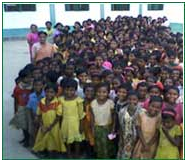
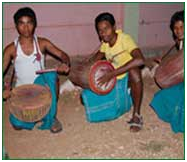
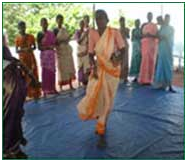
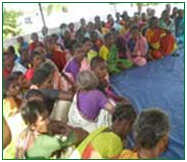
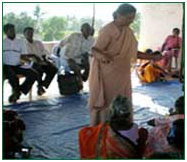
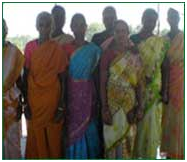
To uplift the lives of the Irular community, a dedicated group of sisters works in Villupuram. They have initiated a movement called PazhangudiIrularKalviMembattuThittam, through which many Irular children benefit every year. Our sisters are fully involved in educating them, employing the following strategies:
- Summer camp
- Residential School
- Sending children to other boarding for studies
- Guiding them to receive higher education and special coaching.
02. Prison Ministry
(i). Our objectives in this ministry
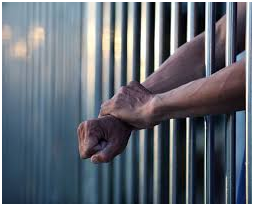
- To bring prisoners out of their dark cells.
- To comfort them and offer solace.
- To restore their lost dignity.
- To integrate them into mainstream society.
- To help heal their brokenness.
- To strengthen their fragmented families.
- To support their spiritual growth.
- To instill good values.
- To promote reconciliation and settlement.
- To mediate between prisoners and their families.
- To provide legal aid.
- To foster compassionate relationships with prisoners.
- To listen to their concerns.
- To counsel them on repairing broken relationships.
- To raise awareness about legal rights.
- To facilitate their renewal, release, and rehabilitation.
(ii). Our activities inside and outside the prison
- Visiting the prison regularly.
- Assisting prisoners who request communication with their families by phone and visiting the families of prisoners.
- Facilitating efforts for reconciliation, compromise, and settlement.
- Participating in the Eucharistic celebration at the prison hospital twice a week.
- Identifying deserving prisoners and assisting them in obtaining bail.
- Seeking benefactors for financial assistance.
- Attending Prison Ministry India meetings on the second Saturday of each month.
- Providing medical facilities for prisoners.
- Assisting in finding employment for them and reintegrating into society.
- Arranging free legal aid.
LIST OF SOCIAL WORK CENTERS IN OUR CONGREGATION
| No | Place | Mission | Beneficiaries |
|---|---|---|---|
| 1 | Balichok | Boarding Home | Tribal Girl Children |
| 2 | Belphahari | Boarding Home | Tribal Girl Children |
| 3 | Burdwan | Home for Children | Children infected with AIDS |
| 4 | Bolarum | Hostel | School Children |
| 5 | Chethupattu | Boarding Home | Poor and Orphan Children |
| 6 | Chittoor | Hostel | Tribal (SC/ST) Girl Children |
| 7 | Christianpet | Boarding Home | Poor, Orphan, Tribal and Prisoners’ Children |
| 8 | Cleveland Town | Boarding Home | Prisoners’ Children |
| 9 | Dudhani - Dumka | Hostel | Tribal Girl Children |
| 10 | Dwarka | Prison Ministry, Ministry for Street Children | Prisoners and the Abandoned Children |
| 11 | Gudiyatham | Home for the Aged | The Aged |
| 12 | Gunadala | Boarding Home | Orphan, Semi-Orphan and Poor Girls |
| 13 | Kadappakkam | Social Work Centre | Dalit Women and Children |
| 14 | Kalakkampadi | Rural Women Development Centre | Tribal Women and Children |
| 15 | Kattupadi | Boarding Home | Orphan, Semi-Orphan, Poor and Tribal Children |
| 16 | Kilacheri | Boarding Home | Orphan, Semi-Orphan and The Poor Girl Children |
| 17 | Kodur | Residential School | Deaf and Dumb Children |
| 18 | Korukollu | Boarding Home | Orphan, Semi-Orphan and Poordalit Girl Children |
| 19 | Kurmun | Rural Women Development Centre | Tribal Women |
| 20 | Kumilanguzhi | Home for Children | Orphan, Semi-Orphan and Poor Girls |
| 21 | Kuttakadu | Home for Children | Tribal Children |
| 22 | Lalgudi | Typing and Tailoring Centre | Young Girls and Women |
| 23 | Mettagalli | Transit Boarding, Tuition Centre | The Young Children |
| 24 | Mettuguda | Boarding Home | The Abandoned Street Children |
| 25 | Nandyal | Hostel Boarding Home | College Girls and Poor Children |
| 26 | New Town | Hostel | The College Girls |
| 27 | NGGO Colony | Boarding Home | Prisoners’ Children |
| 28 | Parinagar | Rural Women Development Centre | The Rural Women |
| 29 | Pavagada | Social Work Centre | Dalit Women and Children |
| 30 | Peddakottla | Boarding Home | School Boys |
| 31 | Perungudi(Chennai) | Typing and Tailoring Centre | Poor Young Girls and Women |
| 32 | Punalvasal | Hostel | School Children |
| 33 | Rajgram | Boarding Home | Poor Tribal Children |
| 34 | Roshanagaram | Boarding Home | Orphan, Semi-Orphan and Poor Children |
| 35 | Sitheri | Social Work Centre and Evening Tuition Centre | The Poor Tribal Women and School Children |
| 36 | Telaprolu | Boarding Home and Social Work | Tribal Dalit Children and Poor Dalit Women |
| 37 | Thatchur | Tailoring Centre | Orphan, Semi-Orphan and Poor Children |
| 38 | Theresapuram | Rural Women Development Centre | Poor Dalit Women |
| 39 | Thirupathy | SC/ST Hostel | Poor Irular Tribal Children |
| 40 | Thondamanthurai | Home For The Aged | The Aged |
| 41 | Varadarajanpet | Hostel | The College Girls |
| 42 | Velliavilai | Home for Children | Orphan, Semi-Orphan and the Poor Girls |
| 43 | Vellore | Working Women Hostel and Tailoring Centre | Working Women and Poor Women in Ariyur, Malaikodi |
| 44 | Villupuram | Social Work Centre | Tribal Women And Children (Irulars) |
Social work ministry by our sisters in other countries
In the following places, our sisters do social work:
01. In Australia
(i). KWY (KornarWinmailYunti) and Aboriginal Family Support Services:
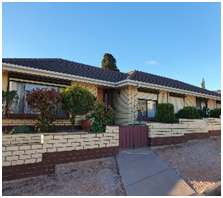
Our sisters assist women in joining the KWY Organization after their release from prison to empower and rebuild their families and communities. This is achieved through raising awareness via events, documentaries, reconciliation week programs, and skill development initiatives. Twice a week, our sisters educate these women on safety and well-being. During their parole, sisters arrange legal aid appointments and accompany them to court. Additionally, they provide transportation to various services such as hospitals, stores, the Salvation Army, and Vinnies. Our sisters also guide former inmates in need of housing and necessities to organizations such as Vinnies, Centacare, and Housing SA. Furthermore, our sisters promote the use of reducing, reusing, and recycling, and encourage women to utilize natural medicine sourced from the bush, as well as healing meditation through dot painting.
(ii). Ministry to Aboriginal Men
Sisters assist men in transitioning houses through the Kokatha Organization. These individuals have been freed but are residing in transitional homes until they can be reunited with their families. The primary objective is to reintegrate them into society and reduce the likelihood of recidivism. Our sisters work with them to provide spiritual support and help them understand the importance of reconnecting with their families and communities with love, care, and concern. Sisters assist individuals in accepting themselves and undergoing transformation so that they may be accepted by society and their families. Despite their feelings of shame and guilt stemming from their past actions, the sisters engage them in various activities, games, prayers, and one-on-one discussions to strengthen their faith, foster hope, and promote a sense of family.
(iii). Prospering after Prison Project (To provide the Aboriginal women with the necessary help to build personal and financial resilience after prison)
Women experience significant challenges on mental, economic, and emotional fronts. Each year, we assist up to 20 Aboriginal women to develop personal resilience, financial stability, life skills, cultural healing, and community connections. By supporting these women, our sisters contribute to the well-being of their entire families and promote productive and integrated living.
(iv). YCW (Young Christian Workers)
The young workers have left their home countries in pursuit of career opportunities and further education. However, the stress they face in their workplaces, with their respective agencies, and among their colleagues becomes overwhelming, leaving them with no one to turn to for support. In response, they come together to share their stress, discuss strategies, and integrate positive attitudes and ideas as a group. Our sisters actively engage in these discussions, guiding them on how to maintain optimism and leverage their God-given capabilities to help those in need. Through these interactions, our sisters assist individuals in rediscovering their values, strengthening their faith, and resetting their lives. By analyzing their experiences and energizing themselves with a positive outlook, they are empowered to return to society and take constructive action.
02. In Italy
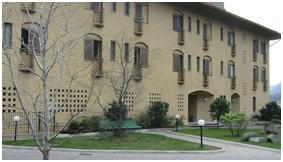
In Europe, the number of elderly individuals residing in residential homes is increasing, highlighting the importance of addressing not only their physical health but also their psychosocial well-being. Many elderly individuals, particularly those living alone or in residential homes, experience feelings of depression and loneliness. While psychotherapy, social work, and other disciplines play a role in addressing these issues, elderly individuals also have significant spiritual needs. Our sisters in Civate minister to the aged in Christ’s name by providing companionship, offering hope and encouragement, facilitating their participation in spiritual activities, and offering the ministry of prayer. These actions aim to address the spiritual and emotional needs of the elderly, promoting a sense of meaning, love, belonging, and morality in their lives.
03. In Spain
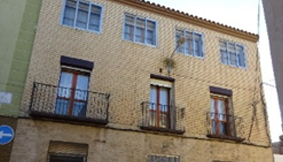
The Novillas aged home currently accommodates 23 elderly residents, with eight of them having a high degree of dependency. This ministry operates around the clock, with our sisters serving as the primary caregivers and responsible individuals for the well-being of the elderly residents.
Until a few years ago, the residents of Zaragoza and the surrounding areas, including the village of Novillas, never imagined that the care of their elderly would be entrusted to sisters from a city in southeastern India. Today, however, they cannot envision life without this partnership. Our sisters arrived in Novillas nine years ago, in the summer of 2013. At that time, the future of the aged home was uncertain, and Mayor José Ayesa made numerous attempts to find an organization to take over its management. Despite his efforts, no viable solution emerged. “Given the small size of the village, managing the facility was challenging, and financial issues were a constant concern,” explains Mayor Ayesa, who remains in office. It was then that our sisters stepped in, driven by a strong desire to serve and assist others. Initially daunted by the cultural differences and administrative tasks, the sisters received ample support and encouragement from the community.